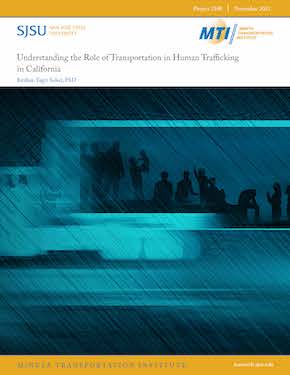- 408-924-7560
- mineta-institute@sjsu.edu
- Donate
Understanding the Role of Transportation in Human Trafficking in California
Human trafficking, a form of modern slavery, is the recruitment, transport, and/or transfer of persons using force, fraud, or coercion to exploit them for acts of labor or sex. According to the International Labor Organization, human trafficking is the fastest growing organized crime with approximately $150 billion in annual profits and 40.3 million individuals trapped in slave-like conditions. While it is not compulsory to involve transportation for human trafficking, the transportation industry plays a critical role in combating human trafficking as traffickers often rely on the transportation system to recruit, move, or transfer victims. This multi-method study investigates the role of transportation in combatting human trafficking in California by conducting a survey followed up with semi-structured in-depth interviews with key stakeholders. The expert input is supplemented with labor violations and transit accessibility analysis. Experts emphasize the importance of education, training, and awareness efforts combined with partnership, data, and analysis. Screening transportation industry personnel for human trafficking is another step that the industry can take to combat this issue. Particularly, sharing perpetrator information and transportation related trends among transportation modalities and local groups could help all anti-trafficking practitioners. In addition, the transportation industry can support the victims and survivors in their exit attempts and post/exit life. Examples of this support include serving as a safe haven, and providing transportation to essential services. Transportation should ensure that all of these efforts are survivor-centric, inclusive for all types of trafficking, and tailored to the needs of the modality, population, and location.
KEZBAN YAGCI SOKAT, PHD
Dr. Yagci Sokat is an Assistant Professor of Business Analytics at San Jose State University and a Research Associate at the Mineta Transportation Institute. Her research focuses on using decision analytics and management science to alleviate human suffering in the areas of human trafficking, humanitarian/non-profit logistics and public health. In collaboration with local, national and international efforts, Dr. Yagci Sokat leads various multi-disciplinary projects to combat human trafficking. Her efforts to combat human trafficking have been supported and recognized by government and organizations such as the United States Department of Transportation (USDOT) and San Jose State University. She received the IBM Public Impact Award for her work on human trafficking in global supply chains.
Dr. Yagci Sokat has served on various multi-disciplinary committees to aid local and national collaborative efforts as a recognized researcher. She is the chair of the Forced Labor Working Group and a member of the Analytics Working Group for the National Outreach Survey for Transportation under the USDOT Combating Human Trafficking in Transportation Impact Award. She has served on the Cook County Human Trafficking Task Force Labor Trafficking Subcommittee, Los Angeles Labor Trafficking Subcommittee and South Bay Coalition to End Human Trafficking. Dr. Yagci Sokat received her PhD in Industrial Engineering and Management Sciences from Northwestern University. She completed her master’s degrees in Industrial Engineering (MSIE) and Health Systems Engineering (MSHS) from Georgia Institute of Technology with a Fulbright scholarship.
-
Contact Us
San José State University One Washington Square, San Jose, CA 95192 Phone: 408-924-7560 Email: mineta-institute@sjsu.edu






